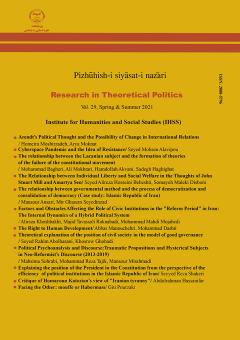The relationship between governmental method and the process of democratization and consolidation of democracy (Case study: Islamic Republic of Iran)
Subject Areas : Research in Theoritical PoliticsMansour Ansari 1 , Mir ghasem seyedinzad 2
1 - Professor of the Department of Political Thought in Islam, Imam Khomeini Research Institute and the Islamic Revolution, Iran.
2 - PhD Candidate in Political Studies of the Islamic Revolution, Imam Khomeini and Islamic Revolution Research Institute, Iran.
Keywords: Democratization, Consolidation of Democracy, Hybrid Democracy, Minimal Democracy, Maximum Democracy ,
Abstract :
Basically, the issue of democratization and consolidation of democracy has been the main concern of humanity, especially intellectuals and philosophers throughout history; because, firstly, democracy is the most effective system for achieving balance and only order involves the least evil, and secondly, in the words of Alfred Smith, all the failures of democracy can be cured with more democracy. However, the rate and percentage of failures and defects are not the same in all countries; For this reason, it is necessary to analyze the systems that have fulfilled all the conditions of democracy to a great extent, the systems that have fulfilled some of the conditions of democracy and the systems that sometimes even have the minimum conditions of democracy. Systems with the first feature are usually democratized, systems with the second feature are hybrid, and systems with the third feature are undemocratic. Each of these governance methods has a direct or indirect relationship with the process of democratization and the consolidation of democracy. In principle, the main problem and question in this research are to explain the relationship between "governmental method" and "the process of democratization and consolidation of democracy" (problem and question). Achieving this goal is pursued with the help of "descriptive-analytical" methods and using the library and digital resources (method). It seems that among the various models of democracy, "minimal democracy" is more closely related to the governing periods of the Islamic Republic of Iran, and "maximum democracy" has the most positive impact on the "process of democratization and consolidation”. (Findings)
انصاری، منصور (1384) دموکراسی گفت¬وگویی؛ امکانات دموکراتیک اندیشههای میخائیل باختین و یورگن هابرماس، تهران، مرکز.
اوتاوی، مارینا (1386) گذار به دموکراسی یا شبه¬اقتدارگرایی، ترجمه سعید میرترابی، قومس، تهران.
آربلاستر، آنتونی (1377) لیبرالیسم غرب؛ ظهور و سقوط، ترجمه عباس مخبر، تهران، مرکز.
بشیریه، حسین (1386) گذار به مردمسالاری (گفتارهای نظری)، تهران، نگاه معاصر.
دال، رابرت (1389) درباره دموکراسی (سر تحول و شرایط تحقق آن)، ترجمه فیروز سالاریان، تهران، چشمه.
دلاپُرتا، دوناتلا (1397) میتوان دموکراسی را نجات داد، ترجمه سعید کشاورزی و علی روحانی، تهران، ثالث.
دیاموند، لاری (1384الف) آیا همه دنیا میتواند دموکراتیک شود؟ ترجمه الناز علیزاده اشرفی، در: کتابگذار به دموکراسی، حسین بشیریه، تهران، نگاه معاصر.
----------- (1384ب) مردم دموکراسی را چگونه میبینند؟ ترجمه منصور انصاری، در: کتابگذار به دموکراسی، حسین بشیریه، تهران، نگاه معاصر.
شفیعی¬فر، محمد (1384) «دموکراسی و عدالت اجتماعی با تأکید بر قانون اساسی جمهوری اسلامی ایران»، فصلنامه مطالعات راهبردی، سال هشتم، شماره اول، شماره مسلسل 27، بهار، صص 49-79.
فاضلی، محمد (1389) بنیانهای ساختاری تحکیم دموکراسی، تهران، کندوکاو.
فوکویاما، فرانسیس (1379) «پایان نظم، سرمایه اجتماعی و حفظ آن»، ترجمه غلام¬عباس توسلی، تهران، جهان امروز.
قاضیمرادی، حسن (1397) گذارها به دموکراسی (تاریخچه پنجاه سال پژوهش¬های دموکراسیسازی)، تهران، اختران.
کارتر، اپریل و جعفریاستوکس (1386) دموکراسی لیبرال و منتقدان آن، ترجمه حمیدرضا رحمانیزاده دهکردی، تهران، دانشگاه علامه طباطبائی.
کدیور، محمدعلی (1386) گذار به دموکراسی (ملاحظات نظری و مفهومی)، تهران، گام نو.
لوین، اندرو (1380) طرح و نقد نظریۀ لیبرال دموکراسی، ترجمه و تحشیه انتقادی سعید زیباکلام، تهران، سمت.
هلد، دیوید (1369) مدل¬های دموکراسی، ترجمه عباس مخبر، تهران، روشنگران.
همپتن، جین (1380) فلسفه سیاسی، ترجمه خشایار دیهیمی، تهران، طرح نو.
Bachrach, Peter (1975) Interest, Paticipation and Democratic Theory. In Pennock,R. & Chapman, J. (eds) Nomos XVI, Participation in Politics. New York, Lieber- Atherrto, pp. 39-55.
Dahl, R.A. (2001) DemocrasiÜstüne, Çev. Betül Kadıoğlu, Ankara Yetkin Yayınlar.
David Collier and Steven Levitsky," Democracy with Adjectives;Conceptual Innovation in Comparative Research"; By / World Politics 49 (April 1997) 430-51.
Diamond, Larry (2003) "Defining Democracy; inThe democracy Sourcebook, Edit by Robert Dahl et. al. The MIT Press Cambridge, Massachusettes.
Diamond, Larry Jay, "Thinking About Hybrid Regimes",Journal of Democracy, Volume 13, Number 2, April 2002, pp-21-35.
Gonzalez, Lucas (2014) Unpacking Delegative Democracy Digging into Empirical Content of a Rich Theoretical Concept, In book Reflections on Uneven Democracies, Publisher Johns Hopkins University Press, Editors Daniel Brinks, Marcelo Leiras, and Scott Mainwaring.
Held, Devid (2007) Models of Democracy, Polity Press.
Levitsky, Steven &Ziblatt, Daniel (2018) Demokrasiler Nasıl Ölür, Salon Yayınları, İstanbul.
Lijphart, Arend (2012) "Patterns of Democracy Patterns of Democracy Forms and Performance in Thirty-SixsContries", Yale University Press/ New Haven & London.
Linz, Juan J. and Stepan, Alfred (1996) Toward Consolidation Democracies; Jurnal of democracy. Vol. 7,No.2.
Matthijs, Bogaards (2009) "How to Classify Hybrid Regimes? Defective Democracy and Authoritarianism", Journal Democratization, Volume 16, Issue 2.
O,Donnell, Gullermo (1993) "Delegative democracy", By, published World Development\ Steven Levitsky & Lucan A.Way (2002) "The Rise of Competitive Autuoritarianism", Jurnal of Democracy Volume 13 Number 2 Apr'l.


